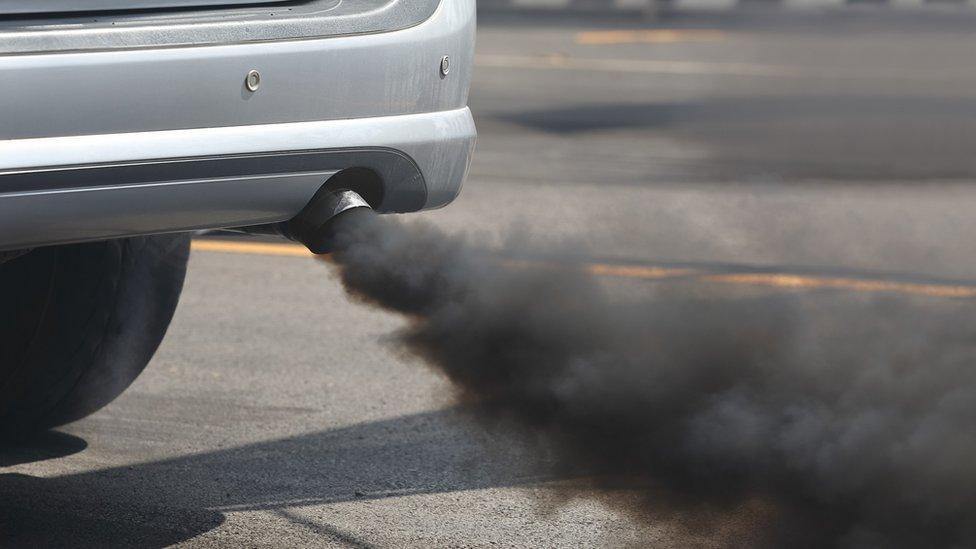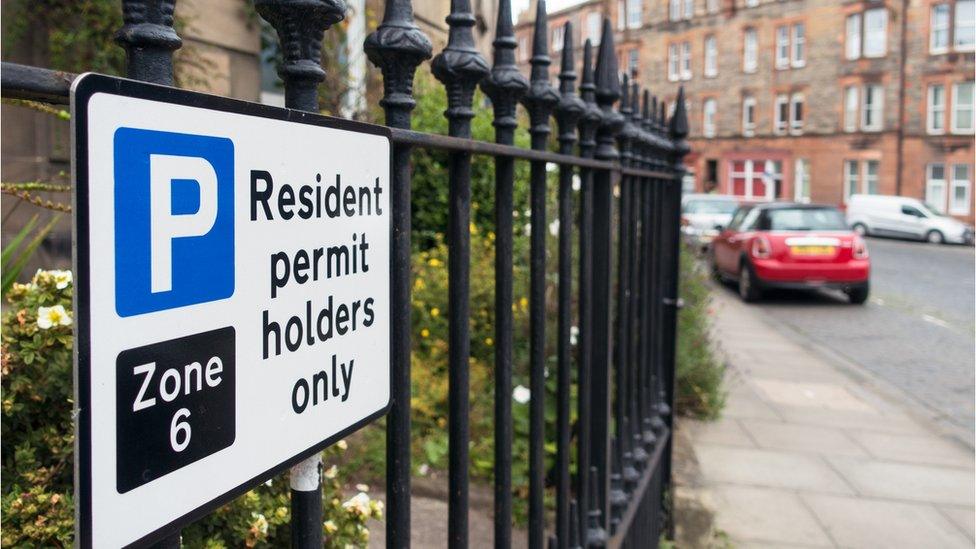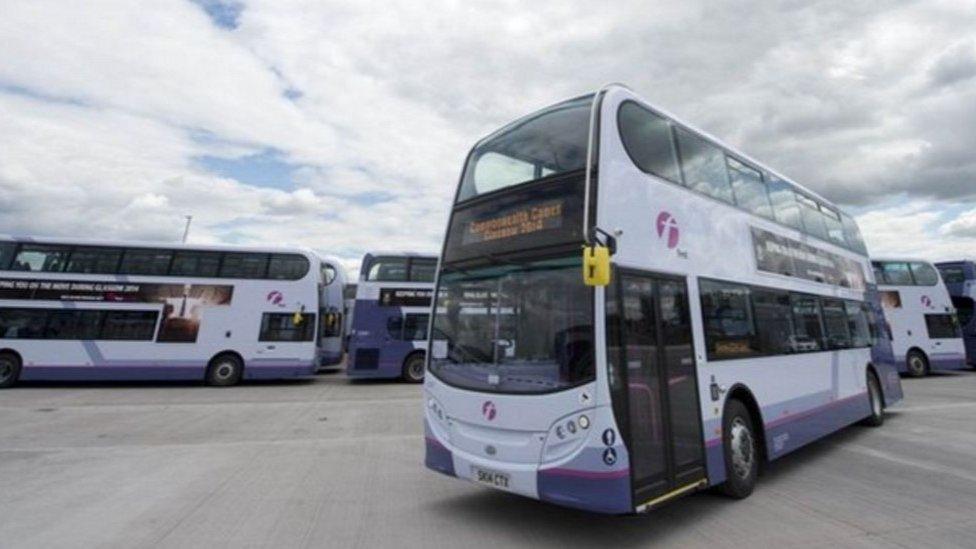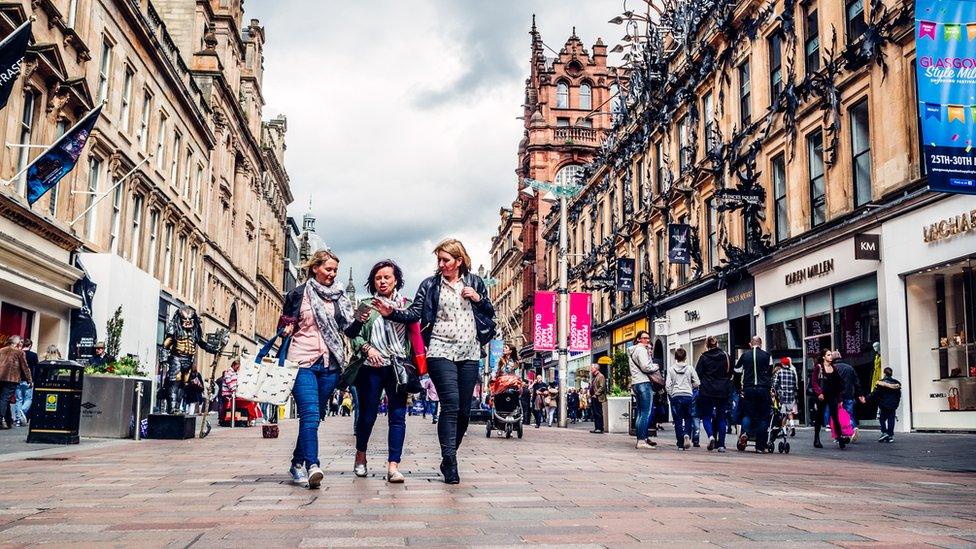No Clean City
- Published

It's time for confession. When it comes to transport, I'm a sinner, and I'm truly sorry.
I own a large diesel-powered car. It is now seven years old, so it doesn't have the most fuel-efficient or low emission of engines.
I drive it a short distance to work, which I ought to walk or cycle, at least some days, and I only rarely go to work with a passenger. I have a bike and don't use it. I'm signed up for the hire bike service, but don't use that either. I park for free at work.
Let's not start on the carbon emissions impact from foreign travel. But in my defence, at least I'm not on the school run - sclerotic for both the roads and children's health.
And I would like to change. Really, I would - using a plug-in electric car, for instance, yet I can't yet see a way for that to work for those of us with on-street parking at home.
Call of fuel duty
The pressure is on to change much of this. There is talk of a workplace parking charge to discourage Scottish commuting by car.
Vehicle Excise Duty is now designed to hit the drivers of big cars, and that faces a ratcheting up. By the time my car is aged 12 and still belching noxious distillates, it may be banned from city centres, starting with Glasgow.
If forward-thinking cities around the world are any guide, there should be discrimination in road space in favour of drivers who carry passengers - or against those who don't.
Fuel tax could be re-designed to discourage me from going that extra mile - that is, instead of an annual road tax, the same revenue could be raised through a higher tax per litre.
Or, as that would discriminate against those in rural areas who need lots of fuel to function in the modern world, there's road pricing - adjustable to charge me more for using busy city streets, and at times when they are busiest.
When I first looked at this, the technology involved basic road-side scanners. The idea of satellite tracking of every vehicle in Britain was fanciful science fiction. Not any longer. Back then, road pricing seemed an intrusion into privacy. That's now a given.
Dear Greener Place
This personal confession is because transport choices are for me, and all of us. The transport choices we all make are determined by price, safety, frequency, reliability and flexibility. And they have a big impact on the quality of life, particularly in cities.
This much is becoming clear from the commission set up in Glasgow to look into its transport future.
Prof David Begg has been put on the case, and wishes to emphasise this is not just for the Dear Green Place, but for other towns and cities that aspire to be greener than they are, though possibly also dearer for the car owner. While Glasgow is congested, so is a major artery for the Scottish economy.
For Glaswegians unfamiliar with Prof Begg, it would be worth a trip to Edinburgh - by train, of course. Any capital cabbies aged over about 40 will share strong opinions about him. Some will be splenetic. Others will concede that, OK, he might have had a point.
He was the Labour councillor who chaired Lothian Region's transport committee in the 1990s, and was a bold revolutionary in squeezing cars off roads. He was also professor of transport policy at Napier University, so Edinburgh was something of a laboratory for him.

Pavements were broadened, on street parking became expensive, bus lanes created, and new workplaces were squeezed for parking space, including the Scottish Parliament. Newcomers were astonished to find they had to pay for a permit to park outside their homes.
As the main shareholder in Lothian Buses, the council pushed investment to make the network attractive for use, and by all types of citizen, while fleet management took the lead on lower emissions. Later, and at some cost, the trams came along.
The intention was to introduce a charge for driving in the city centre, similar to the one in London. The catch was that Londoners are overwhelmingly users of public transport for commuting. They were willing to give the congestion charge a go. Not so in Edinburgh. They weren't ready for it. They distrusted their councillors. And a referendum backfired, taking congestion charging off the capital's agenda for... well, it's still off.
Downhill bus
Having worked on transport policy around England, most recently on connecting its northern cities by rail, David Begg has taken a look at the numbers in Glasgow, and doesn't like what he sees.
Yes, it's got the best suburban rail network outside London. It's got the Subway, thanks to hard-digging Victorians. And in Buchanan Street, it has one of Britain's most attractive and profitable shopping boulevards.
But the city remains dominated by the car. The interim findings of the Glasgow Connectivity Commission, found bus use has fallen dramatically, and much faster than other British cities. For First Bus, numbers are down 40% in a decade.

Buses offer new levels of comfort but Glasgwegians still love their car
Only 3% of the population live in the city centre, whereas that's true of 10% of people in Edinburgh. That not only means more commuting is necessary, but there is less momentum behind the night-time hospitality economy.
Despite having one of the lowest levels of car ownership (linked mainly with poverty, we can assume), Glasgow has a far higher percentage of its land given over to roads - 25%, with pavements taking up only 8%. The comparable figures for Edinburgh are 12% for roads and 10% for pavements.
Glasgow has tried to develop a rail link to get to the airport, but that plan was cancelled 11 years ago. Its bus corridor to the new Queen Elizabeth University Hospital is poorly used.
Some evidence suggests Glasgow city centre is seeing some reductions in traffic. Blocked off routes around George Square and the St Enoch Centre make it a tricky and sometimes expensive drive for those who can't quite get the hang of the "no entry" signs.
That may reflect more internet shopping, which is not a good sign for the vibrancy of the city centre economy.
Glasgow and its neighbouring councils have also allowed developers to build some large out-of-town malls. At peak times, they can get at least as congested as the old city streets.
This report is only to highlight the issues. It doesn't go far down the road - or cycle-path - of solutions. That is for later this year.
But the debate starts here. Glasgow has let other cities take on the driver lobbies, but done little to join that battle.
It has seen government spend big on motorways, to increase capacity. Far less has been done to prepare for a future with fewer cars in it.
A river runs through it
So before Prof Begg and his Connectivity Commission come to their conclusions, let me offer one solution that is something of a personal obsession.
From my desk at Pacific Quay, looking down the Clyde, I can see a waterway with huge potential but hardly any river traffic. I see shiny new pontoons for docking, but few users.
Surely it's time for a river bus service, priced not for tourists but for Glaswegians. Pretend it's a new Subway line, but with none of the drilling and digging costs. Put a terminus near Glasgow Airport, and give visitors to the city a water-borne welcome.
There. That's my free advice, Professor. You're welcome.
- Published31 May 2018
